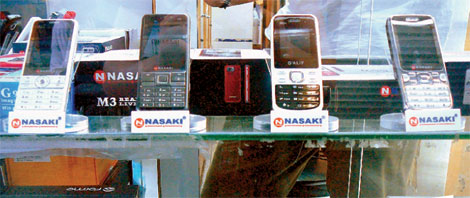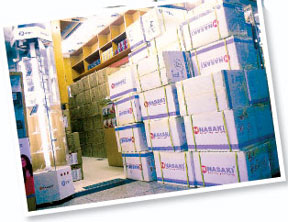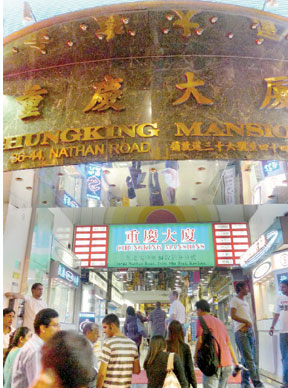Market movers
Updated: 2010-12-10 08:06
By Richard Macauley(HK Edition)
|
|||||||
|
Handsets on display in Chungking Mansions are available to individuals at wholesale prices. Provided to China Daily |
Hong Kong's Chungking Mansions has acquired a reputation for shoddy, sometimes counterfeit goods and shady trading. Despite these liabilities, the Mansions remains an important place for traders from all over the world to make important connections. Richard Macauley reports.
"I can't describe the feeling I get when I go to another country and see my brand on the high street," says Amir Masood. "I was in Pakistan recently with the latest handset from my factory and someone spotted it. They recognised my brand and wanted to know where they could buy the model. It was a great feeling."
Masood, 39, is the Pakistani owner of a company that makes mobile phones. His brand is little known in developed countries but he claims that, should someone travel to India and say his name to a mobile phone importer, they will recognise it.
As he talks, Masood is sitting in the same place he has sat for eight years: his ground floor shop inside Tsim Sha Tsui's infamous Chungking Mansions.
While he discusses his business he is transfixed by the display on his netbook, replying to orders and reading numbers aloud to himself. Every 10 seconds or so he glances up at the cricket, streaming live on his computer.
His monitor is made by Lenovo, the Chinese technology company which just five years ago challenged the West's dominance of the computer market by buying out IBM's PC business.
The name of Masood's phone brand is Nasaki. Even in Hong Kong where he is based, the name is largely unheard of, but he is not competing with the iPhone, Nokia or Sony Ericsson for the Hong Kong market.
His markets are Africa, the Middle East, Pakistan, India and, soon, Southeast Asia.
"Our phones are made with quality materials, and have better functionality than a branded phone," he says. "But you can buy one for $20."
The business employs the logic that, in developing countries, people won't pay $100 for a phone which can be bought for $20.
So far, he appears to be right. "On an average month I sell between 300,000 and 400,000 units." Asked how much he earns from each sale, Masood replies quickly, "one US dollar".
That's a sizeable profit for the modest surroundings in which he does business, but he insists that if he was earning 10 times as much, he would not move his shop from Chungking Mansions.
Trade surrounds Chungking Mansions and, once inside the building, the feeling that deals are being done before one's eyes never leaves.
At the entrance there are money changers. Past these there are reams of technology stores offering the latest in mobile phone hardware - both genuine and fake - at negotiable prices.
Dotted between the stores are food stalls offering snacks from Africa, India and Pakistan. Walking is no easy job with so many traders of so many nationalities scouting out the best wholesale prices for customers in their respective countries.
The activity continues overhead for several floors but the remaining 17 stories become much quieter, giving way to hostels in which many of the traders who work downstairs by day, reside by night.
The point of Chungking Mansions is well aligned with the existence of Hong Kong itself. It is a trading hub, and one which today exemplifies China's growing relationship with Africa.
China's ability to produce goods at low prices meets precisely the demands of a large proportion of the African and Indian population. Masood has found that for many in developing countries, brand names matter less than functionality, and so he is pairing China's low cost labor force with the demand for low cost goods in such countries.
And just like the manufacturers of his computer screen sitting before him, Masood hopes that one day the established phone brands will be looking at his business model to see what he is doing right.
Previously, Masood worked for large telecommunications companies in China but found their reluctance to adapt to different markets frustrating. As such, he started his own company to produce his Nasaki brand.
"Large communications companies would only work with existing brands, so the only technology we dealt with was from large phone manufacturers," he says. "With your own company you can do what you think is better for the world."
Masood pays attention to the needs of his customers in the developing world and brings ideas to his design team in Shenzhen. There, the handsets are designed, engineered and manufactured, before being stacked high in the Chungking Mansions store to await collection.
Surely enough, the phones produced by Nasaki are a breed apart from the large phone brands.
|
Over 1,000 handsets waiting to be dispatched, spilling out of a Chungking Mansions store. Provided to China Daily |
Most boast two sim card slots, allowing those who have multiple contracts to use just one phone instead of two. They have cameras but customers can purchase the memory card separately, meaning those who don't want to take photos don't have to pay for the memory required to do so. In almost all phones an MP3 player and radio is available. Some handsets are able to play MP4.
Remarkably, many will run for up to three days after the battery has run out, able to make and receive calls, send text messages and act as an MP3 player thanks to a powerful inbuilt battery. For customers with unreliable power supplies this could prove a vital factor in choosing a handset.
This ability for small businesses to act nimbly in Chungking Mansions though can also lead to difficulties for some operators.
One English businessman recently had to cease exporting memory cards to the UK after discovering that some of his suppliers were sending him counterfeit cards. He had been visiting Hong Kong from his home in Thailand and had planned to stay in Chungking Mansions just a matter of weeks but in no time he had picked up the business mentality that is so prominent in the building. He remained there for several months exporting goods until he noticed that his supplier could no longer be trusted.
Chungking Mansions' reputation for either counterfeit or shoddy goods certainly works to its disadvantage.
Other businessmen for whom Chungking Mansions is important will not trade directly with those who operate in the building itself out of concern for the quality of the goods they may be buying. Nevertheless however, the contacts the building can offer make it a valuable resource even to those who do not conduct business there.
Ghanaian businessman Solo Zapp, 33, exports mobile technology to Ghana through Hong Kong. Zapp does not work with small or unknown brands but rather deals with products recognisable anywhere in the world.
"If a Chinese manufacturer shows me a genuinely high quality product I would buy it, but I've never seen one so far," says Zapp. "I buy products from brands like Nokia and Apple, from wholesalers in the US or (South) Korea."
Often, he can simply buy wholesale products from shops surrounding Chungking Mansions on Nathan Road.
"Chungking Mansions is a safe place for me to conduct business," explains Zapp. "I meet Africans here with whom I can discuss business or swap contacts.
"I live in Hong Kong and I buy while based here. I listen to my friends in destination countries such as Ghana and Jamaica and, when they tell me the price for what I have is good, I ship them over."
Traders need to trust their business partners in destination countries. Chungking Mansions is populated by a diverse spectrum of nationalities - making it an attractive place to find more partners in a wider range of countries. It's not important if the business itself isn't based in the building.
But back at the Nasaki shop inside, Masood himself explains that there are sometimes difficulties associated with his location.
"I have people asking me whether I can produce goods with a famous brand's logo on them," he says. "You can make a lot of money by making a phone and sticking a Nokia logo on the front, but even if someone offered to buy 100,000 units from me, I would never counterfeit a product.
|
Chungking Mansions, located at 36-44 Nathan Road in Tsim Sha Tsui, acts as a large gathering place for some of the ethnic minorities in Hong Kong. Provided to China Daily |
"You can see that when Customs and Excise officers arrive here, 95 percent of the shops will close their doors because they don't want to be seen. I remain open, whoever comes to see my business."
The benefits of remaining in Chungking Mansions for Masood are clear, however. He has his own manufacturing plant on the mainland, meaning when buyers arrive in Hong Kong and head to Chungking Mansions they are already speaking with the owner of the company.
Other buyers wanting to buy from the mainland and sell in Africa, must travel to Shenzhen which, Masood claims, is an unattractive option for many African buyers.
The value of doing business right here in Hong Kong with a fellow expat, as opposed to dealing on unfamiliar territory in Guangdong, is a value that Masood is putting to work for him.
"Traders go to the mainland because they want to see the factories and meet the company owners," adds Masood. "Being in Chungking Mansions means I can provide that service with much less time and energy spent."
Zapp, too, agrees that there are reasons why Hong Kong remains a vital base for trade, even if he operates on the fringes of Chungking Mansions rather than inside it.
"Doing business here is simple," he says. "I've been here for several years and it works well, things are clear cut."
He says that, like many expats in Hong Kong, he does not intend to be here for the rest of his life but that he would choose no other place at the moment to work.
Asked whether there are distinct differences between his markets in Pakistan and Africa, Masood again shows how his small business is able to adapt to the needs of developing countries.
"In Africa, people just want to know about the functionality and reliability of the product - they might not mind whether it has an MP3 player. In Pakistan though, if it doesn't have an MP4 player it won't sell."
The small - and attentive - business model that is facilitated in Chungking Mansions as a result of China's production capabilities and an international crowd of buyers certainly looks promising for Masood.
Zapp is somewhat less hopeful about the future, citing manufacturing competition from Indonesia and other rising Asian economies. For now, however, there is no sign of a slowdown amid the crowds of Chungking Mansions.
"I won't be here tomorrow," says Masood, despite having just arrived home from Thailand the day before our meeting. "I'll be meeting buyers across Southeast Asia, to expand in these markets. Oh and don't forget," he adds, bringing up a point mentioned earlier, "the brand will be available in Germany in a few months."
(HK Edition 12/10/2010 page4)


